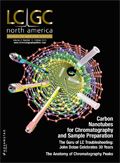John Dolan: Dr. Troubleshooting
LCGC North America
A tribute to John Dolan, who is celebrating 30 years of writing the "LC Troubleshooting" column.
People in my profession tend to think that almost any text can be improved. Indeed, even the most celebrated authors have editors. There are, nevertheless, writers who have the ability to express themselves with such clarity and logic that the process of editing becomes little more than one of layout and proofreading. John Dolan is a member of this rare group. When he submits his monthly installments of "LC Troubleshooting" — always marvelously on time, another rarity among writers — they are so well written that editing them, or perhaps I should say "preparing them for publication" — is a delight.
Dolan's excellent writing is, of course, directly connected to his extensive experience, both writing and teaching. He is now celebrating 30 years of writing monthly columns for LCGC. That writing, in turn, reflects how he spends his days: training chromatographers around the world and helping clients solve problems. Through that teaching and consulting, he has handled every question imaginable, and he seems to know how to answer them all.

Figure 1: (L-R): John Dolan, Jack Kirkland, Lloyd Snyder, and Joe Glajch.
"His years of hands-on laboratory experience gave him great insight into the workings of the liquid chromatograph and mass spectrometer, and he has been able to convey those learnings to others in a clear and lucid manner," said Ron Majors of Agilent Technologies in Wilmington, Delaware, who is a fellow LCGC columnist and, in fact, the only columnist with a longer tenure at the magazine. "Almost any problem encountered in the daily operation of HPLC, John has written about. John is Dr. Troubleshooting."
Other experts in the field all agree that Dolan has a special gift for understanding and explaining liquid chromatography (LC).
"John has an almost unique ability to develop and grasp complex technology, reduce it to practice, and communicate clearly to others how to use it effectively," summed up Tom Jupille, who has been Dolan's business partner for more than 25 years at LC Resources in Walnut Creek, California.
"His ability to explain to both the experts and novices in the field is a major strength of his work," agreed Joe Glajch of Momenta Pharmaceuticals in Cambridge, Massachusetts.
"John's greatest contribution to the field of separation science has been his ability to understand and explain the theory of LC to thousands of new scientists over the past 40 years," said Kerry Nugent of Bruker Daltonics in Auburn, California. "This is especially apparent in his ability to take complex theory and help users apply this knowledge to the practical aspects of this field, as highlighted in his popular LCGC column on LC troubleshooting."
Kari Hallenburg, who was an editor of LCGC during the first seven years of the publication, notes that Dolan, along with Lloyd Snyder, understood that practical, hands-on information about LC instrumentation and applications would be invaluable to the audience of the new publication (then called LC Magazine), particularly given that LC as an instrumental technique was in its infancy at that time. "Readers glommed on to 'LC Troubleshooting' from the start," she said.
"His contributions to LCGC are unequaled," agrees Majors. "People always look forward to the next installment of 'LC Troubleshooting.'"
Computerized Modeling and Method Optimization
In addition to helping separation scientists through his writing and training, Dolan also has played a significant role in facilitating the work of chromatographers through his work on computerized modeling of LC separations.
"His contributions on the hydrophobic subtraction model with Lloyd Snyder will go down as one of the foremost studies on reversed–phase column technology to help chromatographers select the best column for their separations," noted Majors.
"John's vital input on computerized methods for optimization of HPLC separations (the "DryLab" software from LC Resources) has equally been effective in developing the HPLC separation method to its present importance," said Joseph J. Kirkland of Advanced Materials Technology in Wilmington, Delaware.
Updating the LC Bible
In 2010, Dolan also joined his colleagues and friends Snyder and Kirkland in the third edition of their 1979 classic, Introduction to Modern Liquid Chromatography. This was a much expanded and updated version of the second edition, which has often been referred to as "the Bible of HPLC."
"The third edition of the book was a major undertaking and was needed to update the classic second edition to the 'modern' world of HPLC," notes Glajch. The book has been a best seller of chromatography, and is now being translated into several other languages. "This book is on the bookshelf of anybody who is a serious practitioner of LC," said Majors.
Always Willing to Help
Many also praised John Dolan's personal qualities, which come through in his work.
"John has a friendly and engaging personal manner and a sense of humor which makes working with him a real pleasure," said Kirkland. "He also displays a unique diligence that ensures that a goal is attained regardless of the difficulties involved."
"John is brilliant but very down to earth and easily approachable and someone you can count on to stand by his work," agreed Nugent.
"Personally, John is a wonderful human being," said Majors. "He is always pleasant and I've never seen him angry. He is always willing to answer the simplest questions and make time for young chromatographers." Majors noted that Dolan's even temper and philosophical approach to problems are likely connected to his religion. "John has a great faith in his daily living," he said.
"John is remarkably unassuming and friendly," added Snyder. "These qualities, along with his other talents, have made him an extremely effective teacher."
Snyder elaborated on some of those other talents. "John is extremely resourceful and hardworking, and has a remarkable knack for becoming expert in whatever he is involved with," he says. "As an example, within a year after he joined my group at Technicon, other employees from throughout the R&D department would come to John asking his help. Similarly I had other managers asking if John might be reassigned — at least temporarily — to their group."
An Unassuming Celebrity
Perhaps John Dolan's role in the world of LC is summed up by the reaction Hallenburg describes seeing at Pittcon, when attendees' eyes light up after reading John's badge.
"You're John Dolan!?" they exclaim.
"He's quite the celebrity in the world of analytical chemistry," she says.
Indeed he is. And here at LCGC, we are very grateful for his 30 years of contributions — to LCGC and our readers.
Laura Bush
Editorial Director

Laura Bush

Investigating 3D-Printable Stationary Phases in Liquid Chromatography
May 7th 20253D printing technology has potential in chromatography, but a major challenge is developing materials with both high porosity and robust mechanical properties. Recently, scientists compared the separation performances of eight different 3D printable stationary phases.
Detecting Hyper-Fast Chromatographic Peaks Using Ion Mobility Spectrometry
May 6th 2025Ion mobility spectrometers can detect trace compounds quickly, though they can face various issues with detecting certain peaks. University of Hannover scientists created a new system for resolving hyper-fast gas chromatography (GC) peaks.
University of Oklahoma and UC Davis Researchers Probe Lipidomic Profiles with RP-LC–HRMS/MS
May 6th 2025A joint study between the University of Oklahoma Health Sciences Center (Oklahoma City, Oklahoma) and the UC Davis West Coast Metabolomics Center (Davis, California) identified differentially regulated lipids in type 2 diabetes (T2D) and obesity through the application of reversed-phase liquid chromatography-accurate mass tandem mass spectrometry (RP-LC-accurate MS/MS).

.png&w=3840&q=75)

.png&w=3840&q=75)



.png&w=3840&q=75)



.png&w=3840&q=75)











